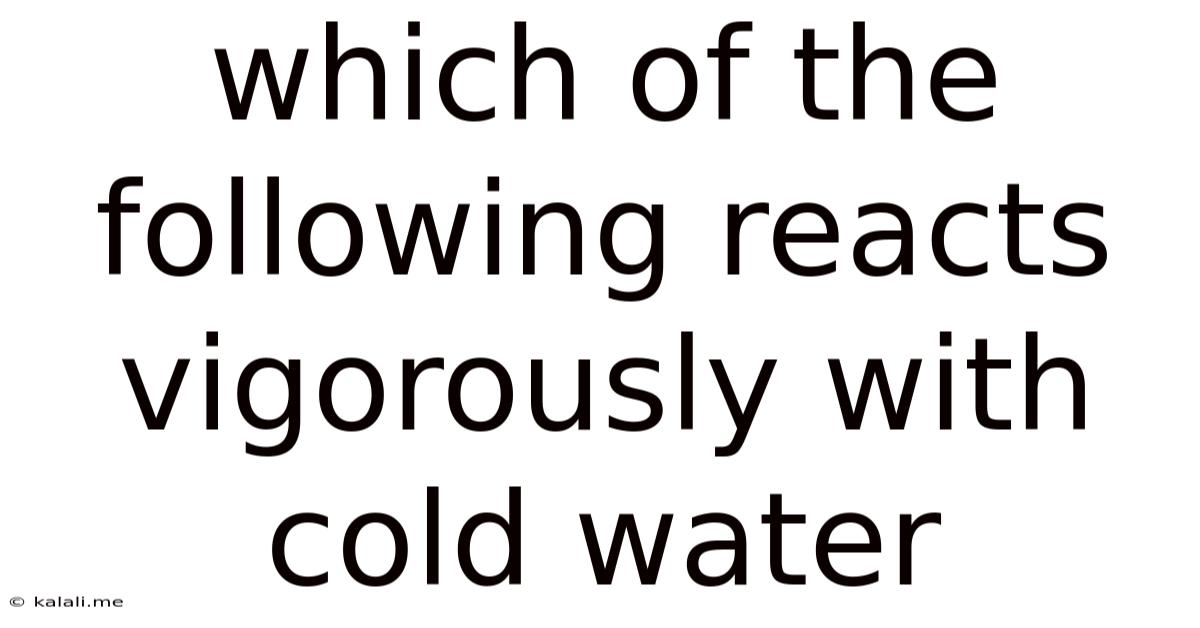Which Of The Following Reacts Vigorously With Cold Water
Kalali
Jun 11, 2025 · 3 min read

Table of Contents
Which of the Following Reacts Vigorously with Cold Water? Understanding Alkali Metals and Reactivity
This article explores the reactivity of different elements with cold water, focusing on which elements react vigorously. Understanding chemical reactivity is crucial in various fields, from chemistry and material science to environmental science and even cooking. We'll delve into the specifics of alkali metals and their unique properties, helping you understand why some elements react much more strongly than others.
The question of which element reacts vigorously with cold water often appears in chemistry examinations and is key to understanding the periodic table's trends. While many elements might react with water under specific conditions (high temperature, pressure, etc.), only a select few show vigorous reactions with cold water. This vigorous reaction is typically characterized by the rapid release of heat, often accompanied by the production of hydrogen gas and a hydroxide solution.
Alkali Metals: The Stars of the Show
The alkali metals, located in Group 1 of the periodic table, are notorious for their high reactivity. This stems from their electronic configuration: they possess only one electron in their outermost shell. This single electron is easily lost, leading to the formation of a +1 ion. This ease of electron loss is the driving force behind their vigorous reactions with water.
The reactivity generally increases as you move down the group. This is because the outermost electron becomes further from the nucleus and is more shielded from the positive charge of the protons, making it easier to remove.
Let's examine some examples:
- Lithium (Li): While lithium reacts with water, the reaction is relatively less vigorous compared to other alkali metals. It fizzes gently.
- Sodium (Na): Sodium reacts more vigorously than lithium. The reaction is characterized by rapid fizzing, the release of heat, and the formation of sodium hydroxide (NaOH) and hydrogen gas (H₂).
- Potassium (K): Potassium reacts even more vigorously than sodium. The reaction is faster and generates more heat, with a noticeable flame.
- Rubidium (Rb) and Cesium (Cs): These elements react extremely vigorously with water, often igniting spontaneously and producing a significant amount of heat. The reaction is so exothermic (releases a large amount of heat) that it can be dangerous.
Other Elements and Their Reactivity with Water
It's important to note that while alkali metals react vigorously with cold water, other elements have different levels of reactivity or require specific conditions to react. For example:
- Alkaline Earth Metals (Group 2): These metals also react with water, but generally less vigorously than alkali metals. Their reactivity also increases as you move down the group.
- Halogens (Group 17): These non-metals react with water, but the reactions are often more complex and don't usually involve the same level of vigorous reaction as seen with alkali metals.
- Transition Metals: The reactivity of transition metals with water varies significantly, and many require specific conditions to react.
Conclusion: Understanding Reactivity
In summary, among common elements, sodium (Na), potassium (K), rubidium (Rb), and cesium (Cs) react vigorously with cold water. The intensity of the reaction increases as you move down Group 1 of the periodic table due to the increasing ease of losing the single electron in their outer shell. This understanding is fundamental to comprehending chemical reactivity and the properties of elements within the periodic table. Always remember to handle these reactive metals with extreme caution due to their potential for dangerous reactions.
Latest Posts
Latest Posts
-
How Many Blades Of Grass Are There In The World
Jul 01, 2025
-
How Long Is Mayo Good For After Expiration Date
Jul 01, 2025
-
How Many Oz In A Lb Of Pasta
Jul 01, 2025
-
What Year Was I Born In If Im 19
Jul 01, 2025
-
How Many Cups Is 238 Grams Of Miralax Powder
Jul 01, 2025
Related Post
Thank you for visiting our website which covers about Which Of The Following Reacts Vigorously With Cold Water . We hope the information provided has been useful to you. Feel free to contact us if you have any questions or need further assistance. See you next time and don't miss to bookmark.